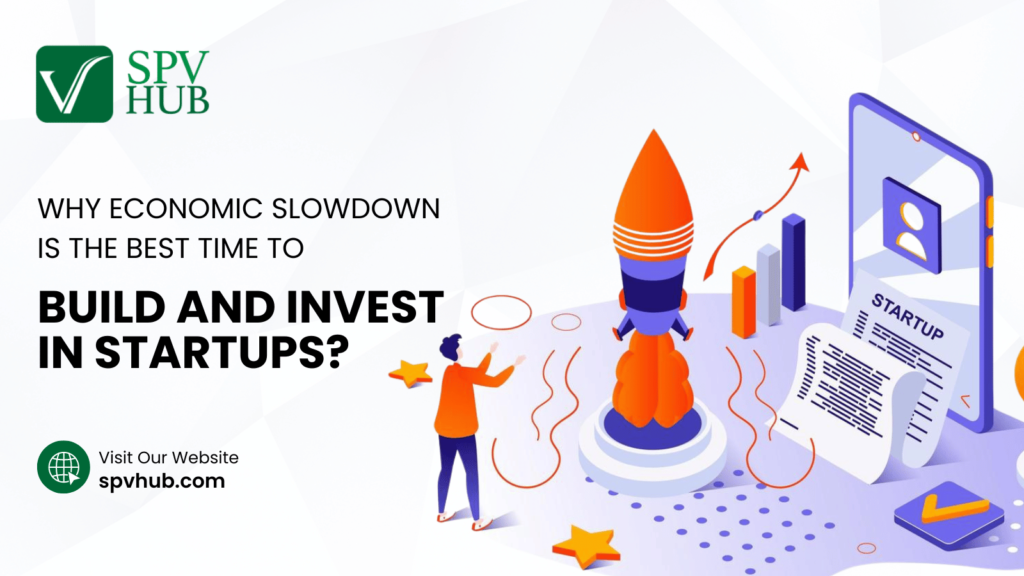Although the startup ecosystem is currently experiencing an economic slowdown, with US tech firms contending with a recession, global inflation, and the Russia-Ukraine conflict, there is a prevailing sentiment of setback. The reduced availability of funds in circulation posed challenges in selling products or obtaining funding, with investors and companies adopting more conservative approaches. The business environment underwent substantial changes. Despite the apparent drawbacks, it’s essential to delve into the unexpected opportunities that emerge during downturns, especially for startups.
It’s worth noting that crisis-induced periods often present significant investment opportunities in the private markets. Our readers must wonder why investing during an economic downturn can be called smart investing. In this blog, we will be answering why entrepreneurship During a recession, investing in startup companies, or launching a startup can be worthwhile during an economic slowdown.
The notable successes of Airbnb and Stripe, among the foremost startups today, cannot be overlooked. Originating during the recession of 2009, these companies illustrate how downturns can foster innovation and enduring solutions. Demonstrating remarkable adaptability, they developed products and services tailored to their era’s cost-conscious climate and economic demands.
Similarly, WhatsApp was founded in 2009, amidst the recession, and later acquired by Facebook for billions of dollars. Slack emerged during the 2008 financial crisis and quickly gained traction as a business communication tool, eventually being acquired by Salesforce.
These success stories highlight how downturns can provide fertile ground for visionary entrepreneurs to create impactful and lasting businesses.
Let’s see why an economic slowdown can be promising for investment in the startup ecosystem:
Valuation Adjustments: Economic downturns often lead to decreased startup valuations. This means that investors can acquire stakes in promising companies at lower prices than in periods of economic boom. Lower valuations can translate to higher returns when the market eventually rebounds.
Innovative Solutions: Crises often stimulate innovation as entrepreneurs seek to address new challenges and capitalize on emerging trends. Startups that offer solutions to pressing problems during a crisis may find themselves in high demand once market conditions improve. Investing in such companies early on can yield significant returns as their solutions gain traction.
Less competition: During economic downturns, some investors may become more risk-averse or face constraints on capital deployment. This can result in decreased competition for investment opportunities, allowing savvy investors to negotiate more favorable terms and secure positions in promising startups that may have been oversubscribed during periods of economic prosperity.
Diversification Benefits: Adding startup investments to a diversified portfolio can help mitigate risks associated with other asset classes, such as publicly traded stocks and bonds, which economic downturns may also impact. Startups often have different risk profiles and growth trajectories than traditional investments, providing potential diversification benefits for investors.
While short-term market fluctuations and crises can create volatility, investors who focus on startups’ underlying fundamentals and growth potential may find opportunities to generate substantial returns over the long term.
However, it’s essential to cautiously approach investing in startups during crisis-induced times. While there may be promising opportunities, there are also heightened risks, including increased uncertainty, the potential for business failure, and liquidity challenges.
Investors should conduct thorough due diligence, diversify their portfolios, and seek guidance from experienced professionals to navigate the complexities of startup investing during periods of economic uncertainty.
Strategies for Startup Building
Act Swiftly (While Larger Competitors Reorganize):
Inherently nimble and agile startups possess an edge in swiftly adapting to evolving economic conditions compared to cumbersome corporate giants. During recessions, startups can capitalize on the vulnerabilities of larger incumbents by identifying and addressing weaknesses and positioning themselves strategically to exploit opportunities that may arise.
Solve Emerging Problems:
Adept at problem-solving, startups can focus on refining their offerings to address pressing customer pain points. The recessionary period becomes an opportune time for startups to fine-tune their products and achieve market fit. Historic examples like Apple and Microsoft highlight the potential for startups to thrive in recessionary climates.
Cost Efficiency (While Corporations Trim Excess):
There is a reduction in prices across products and services. Savvy entrepreneurs capitalize on this by leveraging cost savings to grow their businesses. With struggling enterprises offloading assets at discounted rates and consumers prioritizing value, startups can compete effectively by offering competitive pricing and attracting a more extensive customer base.
Attract top talent (while corporations downsize):
Rising unemployment rates during downturns result in a surplus of skilled professionals seeking new opportunities. Startups can seize this opportunity to recruit top-tier talent, building robust teams poised to navigate challenging economic environments.
Additionally, downturns often inspire entrepreneurial aspirations in individuals unable to secure traditional employment, potentially leading to valuable co-founder partnerships.
Prepare for Recovery (Positioning for Rebound):
Despite the economic gloom, recessions eventually give way to recovery phases. Startups that weather the storm emerge as resilient contenders, well-positioned to capitalize on growth opportunities. Investors eager to identify promising ventures may show heightened interest in funding startups with proven resilience and market traction.
As the broader economy rebounds, startups with established product-market fit are primed to capitalize on growth trajectories.
Bonus tips for startup founders:
Exercise Capital Discipline: Avoid overcapitalization in the early stages, as it can diminish discipline and lead to excessive dilution, hindering the company’s long-term growth potential. Invest only what is necessary and maintain awareness of your stake in the company to foster a mutually beneficial partnership with investors.
Prioritize Business Development: Focus on building a solid business foundation rather than solely concentrating on expanding the user base. Emphasize sustainable growth and unit economics from the outset, ensuring a solid foothold in the market even during economic uncertainties.
Customer Validation Over Investor Approval: Direct efforts towards winning over customers rather than seeking validation from investors. Customer satisfaction should be at the forefront of discussions, as their support ultimately drives the business’s success.
Avoid Name-Dropping and Valuation Obsession: Refrain from name-dropping investors during fundraising efforts, as it may detract from the conversation. Similarly, please don’t fixate on valuation, as it can distract from building meaningful partnerships with investors who can contribute significantly to the company’s growth trajectory.
In Conclusion
You should focus on value beyond valuation. Prioritize investments in startups that focus on solving specific problems. Seek out founders who prioritize building sustainable businesses over chasing high valuations. Invest in startups with strong business models and a balanced approach to growth and profitability. By adhering to these principles, startup founders and investors can navigate economic turndowns with resilience and emerge more vital in the long run.

I’m the Co-Founder of Startup Steroid, where I help founders navigate the challenges of building a startup. From connecting with the right investors and talent to guiding marketing, legal, and MVP development, I work alongside entrepreneurs to provide practical support and clarity, helping them grow their ideas into successful, sustainable businesses.






